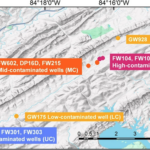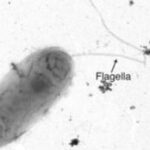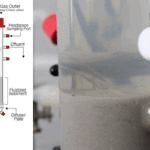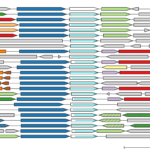ENIGMA undergraduate researcher Luz Arias who presented at the Arkin Lab Spring Semester Undergraduate Poster Session! The semi-annual poster session was hosted by co-investigator Adam Arkin’s lab at the Innovative Genomics Institute at UC Berkeley on Wednesday, May 14, 2025. During the poster session, ENIGMA undergraduate researcher Luz Arias from the Arkin Lab had the […]
ENIGMA
Functional Resilience in Microbes found in Groundwater
ENIGMA researchers studied microbes living in groundwater at a site contaminated with metal, acid, and other waste. They compared wells with high, medium, low, and no levels of contamination. They found that even when microbial species count decreased under stress, groups of microbes compensated to sustain essential functions.
Machine Learning Reveals Patterns of REC Protein Domain Evolution
Bacteria can evolve by exchanging genetic material through a process called recombination. This study used machine learning models combined with functional laboratory experiments to show that after recombination, a bacterial signaling system changed and expanded its protein family, despite considerable selective pressures in place that constrained new modifications.
How Bacteria Adapt to Stress
Berkeley Lab researchers uncovered a distinctive adaptation that some bacteria use to quickly form protective communities called biofilms, which help them survive in adverse environments. The work could lead to better stewardship of areas with high levels of heavy metals, nutrients, or other forms of hazardous waste.
From Field-to-Lab and Lab-to-Field: How Microbes Evolve, Form Partnerships and Work Together
Researchers in the Institute for Systems Biology’s Baliga Lab examined model organisms from two classes of microbes whose interaction converts over a gigaton of carbon to methane each year and found that gene mutations selected for over a relatively short timeframe in the two microbes –Desulfovibrio vulgaris (Dv) and Methanococcus maripaludis (Mm)– led to distinct functions, specifically ecotypes, or sub-populations, that are more specialized to either an attached or floating lifestyle.
Huang Explores How Bacteria Store Carbon at 2024 BioEPIC Research SLAM
Congratulations to Joshua Jiaqi Huang, a UC Berkeley graduate student researcher in Biosciences senior faculty scientist Adam Arkin’s group, who represented ENIGMA and Biosciences at the 2024 BioEPIC Research SLAM.
fast.genomics: A Fast Comparative Genome Browser for Diverse Bacteria and Archaea
ENIGMA researchers have developed fast.genomics, a new tool which allows users to search for a protein and identify other proteins that share a common ancestor or are located in similar genomic regions.
Multi-disciplinary research develops a deeper understanding of subsurface microbiology
ENIGMA is organized into three aims that reflect the different research scales (i.e., field level to molecular level) required to build a comprehensive picture of subsurface microbiology at the Oak Ridge Reservation (ORR): Subsurface Observatory, Environmental Atlas, and Environmental Simulations. Several key research initiatives, described in this cross-aim overview, highlight this framework in action.








